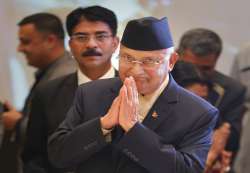Real Ayodhya in Nepal, Lord Ram not Indian: Nepal PM Oli
Stoking a controversy, Nepal Prime Minister KP Sharma Oli said real Ayodhya was in Nepal and not India. He also went on to say that Lord Ram was a Nepali and not Indian. "Real Ayodhya lies in Nepal, not in India. Lord Ram is Nepali, not Indian," news agency ANI quoted Nepali media as saying.

Stoking a controversy, Prime Minister KP Sharma Oli on Monday said that the "real" Ayodhya lies in Nepal and not in India. He also went on to say that Lord Ram was Nepali and not Indian. He was born in Thori in southern Nepal, Oli said. The embattled prime minister was speaking at an event on the birth anniversary of Nepalese poet Bhanubhakta at the Prime Minister's residence in Kathmandu. Oli said that Nepal "has become a victim of cultural encroachment and its history has been manipulated."
"Although the real Ayodhya lies at Thori in the west of Birgunj, India has claimed the Indian site as the birthplace of Lord Ram,” Oli said.
We also believe that deity Sita got married to Prince Ram of India. Actually, Ayodhya is a village lying west of Birgunj,” he said, adding that the marriage between bride and bridegroom at such a distance was not possible at the time when there was no communication and transportation system.
"The place called Thori, near Birgunj is the real Ayodhya, where Lord Ram was born. In India there is great dispute on Ayodhya. But, there is no dispute in our Ayodhya," Prime Minister Oli was quoted as saying by his press advisor Surya Thapa.
“Valmiki Ashram is also in Nepal and the holy place where King Dasharath had executed the rites to get the son is in Ridi, which is in Nepal,” he said. As Dasharath was the ruler of Nepal, it is natural that his son Ram was also born in Nepal, Oli argued. Therefore, real Ayodhya lies in Nepal, he claimed.
Many scientific inventions and knowledge originated in Nepal, but unfortunately such a rich tradition could not continue later, Oli said.
His allegations have been criticised by senior NCP leaders, including former prime minister 'Prachanda', who demanded Prime Minister Oli's resignation, saying his recent anti-India remarks were "neither politically correct nor diplomatically appropriate."
The India-Nepal bilateral ties came under strain after Defence Minister Rajnath Singh inaugurated a 80-km-long strategically crucial road connecting the Lipulekh pass with Dharchula in Uttarakhand on May 8. Nepal reacted sharply to the inauguration of the road claiming that it passed through Nepalese territory. India rejected the claim asserting that the road lies completely within its territory.
Recently, Nepal redrew the country's political map through a constitutional amendment, incorporating three strategically important Indian areas. The Nepal Parliament also approved the new political map of the country featuring Lipulekh, Kalapani and Limpiyadhura areas which India maintains belong to it. India has already termed as "untenable" the artificial enlargement" of the territorial claims by Nepal.
Last week, Nepal stopped the transmission of all Indian private news channels except Doordarshan, accusing them of airing reports hurting the country's national sentiment.
(With PTI inputs)